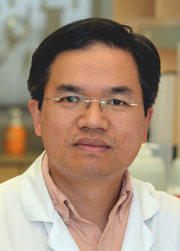
The principal focus of the Lin laboratory is to understand the molecular mechanisms governing vascular and hepatic function. The lab has made some seminal contributions, as outlined below:
(1) KLF2 as an important regulator of endothelial function. The vascular endothelium is a vital organ whose health is essential to normal vascular physiology and whose dysfunction can be a critical factor in the pathogenesis of vascular disease. The lab's quality work led to the identification of a transcriptional regulator of endothelial pro-inflammatory activation termed Krupple-like factor 2 (KLF2). In a series of investigations, the lab's efforts provided evidence in support of KLF2 as a “molecular switch” regulating endothelial function. This works to advance understanding of the basic mechanism of transcriptional activation and repression by KLF2.
(2) Role of other KLFs in mammalian physiology. The Krupple-like factor (KLF) family of transcription factors play pivotal roles in regulating diverse aspects of mammalian biology. In collaboration with other investigators, the Lin lab documented the essential functions of KLF2 in macrophage biology, KLF4 in endothelial biology and KLF15 in cardiac biology. This works to broaden knowledge of KLFs in physiology and pathophysiology.
(3) Novel functions of matricellular protein CCN3 in vascular biology. CCN (Cyr61, Ctgf, Nov) proteins are a group of secreted extracellular matrix-associated signaling proteins that are capable of mediating diverse biologic functions. The function of CCN3 in vascular biology in vivo remains largely undefined. The Lin lab's study highlighted CCN3 as a flow-inducible factor and a novel negative regulator of endothelial inflammation. More recently, the lab's efforts illuminate the novel role of CCN3 in the regulation of abdominal aorta aneurysm (AAA) initiation and progression. The study provided evidence that CCN3 possesses pleiotropic beneficial effects to curtail every single key aspect of AAA pathology (vascular inflammation, smooth muscle cell loss, MMPs elaboration and reactive oxygen species production). The lab's work introduces an entirely novel matricellular protein as a nodal regulator of AAA pathogenesis while mechanistically elucidating key steps in the intracellular signaling pathways which mediate the CCN3-dependent response.
(4) KLF15 as a regulator of alcohol metabolism. The studies of the Lin lab have identified a circadian factor Kruppel-like factor 15 as an important mediator of alcohol metabolism. In the lab's study, it found that two critical enzymes involved in alcohol metabolism termed mitochondrial aldehyde dehydrogenase 2 and tryptophan 2,3 dioxygenase, exhibit circadian rhythmicity. Moreover, the circadian rhythm of these two enzymes is abolished in Kruppel-like factor 15 knockout mice and these animals develop liver damage in response to alcohol feeding. Currently, the lab is dissecting the underlying mechanisms by which KLF15 deficiency accelerates alcohol-induced liver injury.